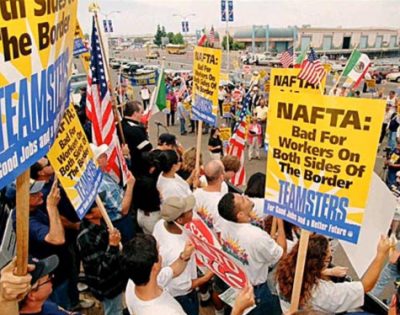Ten Reasons Canada Should Get Out of NAFTA

For months Canadians have been inundated with claims from the government, various and sundry industries, and the national punditry, that NAFTA is good for our country, even necessary, and that “renegotiated” it will be even better. In the aftermath of US president Trump’s recent visit to Canada, virtually the entire Canadian political class has completely abandoned the vision of an independent, sovereign Canada. From the prime minister on down they rush to Brian Mulroney, the architect of the integration of Canada into the US, for direction and advice on how to “save NAFTA.” The door is now wide open for our country to take a different route, to reject NAFTA and build a nation which controls its own economy and destiny. Here are ten reasons why Canada should free itself from NAFTA, not enter more deeply into it.
One: Under NAFTA US corporations have the right to sue Canada for any law or regulation which they do not like and which they feel contravenes the spirit of NAFTA. US corporations have sued Canada 42 times under NAFTA, overturned Canadian laws and received over $200 million in NAFTA fines, plus approx. $100 million in legal fees, from Canada — and have filed claims for some five billion more. Why would any nation give foreign corporations the right to sue it and dictate its laws? (Canadian corporations can also sue the US. They have tried several times and failed each time.)
Two: Under the FTA, which is part of NAFTA, Canada agreed to never charge the Americans more for any good that we export to them than it charges Canadians. Why would Canada ever agree to such a provision and what in the world does it have to do with free trade?
Three: Canada agreed that it would never cut back on the amount of any good, including all forms of energy, that it sells to the US unless it cut back on Canadians proportionally at the same time. Why would Canada agree to deny its own citizens preferential access to their own resources?
Four: Except for a few exceptions, Canada agreed to allow US citizens and corporations to buy up Canadian companies and industries without restriction. They have taken over thousands of Canadian companies, from both our national railways to our retail industry to our grain companies. In 1867 the US purchased Alaska for $7 million. It is now purchasing Canada just as surely.
Five: Under NAFTA Canada’s standard of living has not risen, it has fallen. The real wages of Canadians are dropping steadily, and the divide between haves and have nots has soared.
Six: NAFTA is not free trade. It is the integration of North America into a continental economy. Integration means assimilation and that for Canada means the end of our country.
Seven: Locked into NAFTA Canada loses its ability to be an independent country. We see our country following the US on the world stage, even attacking and bombing small nations that have done no harm to Canada because, some of our leaders suggest, we must follow the US because our economies are so intertwined. (Then we watch some of the same leaders wringing their hands over the agony of the fleeing refugees our bombs have helped to create!)
Eight: Farsighted Canadian leaders have repeatedly warned their fellow citizens against free trade with the United States. John A. Macdonald called the very idea “veiled treason” because it meant giving control of our nation to a foreign power. George-Etienne Cartier said the end result would be union with United States, “that is to say, our annihilation as a country.” Robert Borden called free trade “the most momentous question” ever submitted to Canadians “not a mere question of markets but the future destiny of Canada.” John Diefenbaker called on Canadians “to take a clear stand in opposition to economic continentalism” and the “baneful effects of foreign ownership.” Pierre Elliott Trudeau called the FTA “a monstrous swindle, under which the Canadian government has ceded to the United States of America a large slice of the country’s sovereignty over its economy and natural resources.” John Turner called it “the Sale of Canada Act.”
Nine: In its early days Canada had no income tax. It used the revenue from tariffs on imported goods to finance the operation of the country and it had little or no debt throughout much of its history. Today after three decades of “free trade” with the US, Canada is carrying a record $1.2 trillion in federal and provincial debt and the tax burden on ordinary Canadians increases year after year. The rate of homelessness and use of food banks has escalated, public institutions and programmes on which citizens rely have been cut, while record amounts of raw resources are being poured across the border at fire sale prices.
Ten: Canada’s economy is roughly one tenth the size of that of the US. If we do not protect our industries, our sovereignty, and our economy, our country will be absorbed into the United States. This means the end of the dream of an independent Canada standing among the world’s nations with pride and dignity. It not be so. Both the FTA and NAFTA have cancellation clauses. With a simple 6 month’s notice Canada can withdraw without penalty. All three NAFTA countries are members of the World Trade Organization and our trade with them would simply revert back to WTO rules, under which we did much better than we have under NAFTA, and without any US corporate right to sue us or buy up our country.
*
David Orchard was twice a contender for the leadership of the Progressive Conservative Party of Canada. He is the author of The Fight For Canada: Four Centuries of Resistance to American Expansionism. He can be reached at [email protected]

